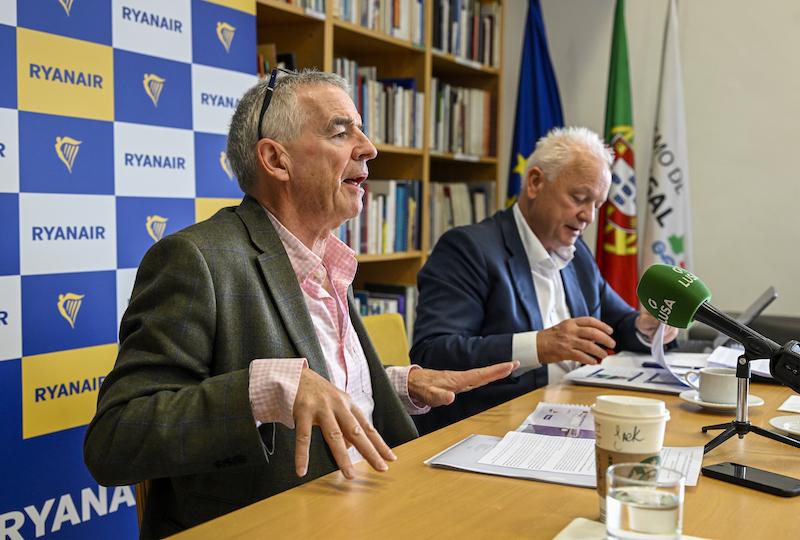
Ryanair Group CEO Michael O'Leary, left, and CEO of Ryanair DAC, Eddie Wilson.
Ryanair plans to reduce its schedule from Dublin Airport (DUB) this winter and move 19 aircraft to other European bases, strongly criticizing airport operator Daa for increasing passenger charges and what it considers to be wasteful spending and a lack of environmental incentives.
The ULCC intends to cut 17 routes during the forthcoming winter 2023-24 season, including flights to Genoa and Sicily in Italy, and remove 19 Boeing 737-8200s from its Dublin-based fleet. The aircraft will be relocated to bases in Spain and Italy, as well as London Luton Airport.
In a strongly worded attack on Daa, which includes a 9-min. video outlining its concerns, Ryanair says it made the decision due to Daa’s “rising passenger charges of 45%, ongoing Capex mismanagement and their failure to deliver a meaningful environmental incentive scheme that rewards lower-emission aircraft.”
The carrier accused Daa of a “massive waste of capital expenditure” over its plans to build a €250 million ($266 million) tunnel underneath one of DUB’s runways. It says that employees and emergency personnel already have access to the airport via existing infrastructure, and that current road access is sufficient for cargo traffic.
Additionally, Ryanair criticized Daa’s alleged lack of plans for expanding gates and capacity, claiming that the last major terminal investment—Terminal 2, which opened in 2010—was not suitable for expansion. It called on the airport operator to prioritize investment on growing Terminal 1 capacity.
“Daa needs to build low-cost infrastructure to support passenger growth and connectivity, but has failed to implement a growth incentive scheme or, indeed, lower charges that reward those airlines who invest in lower-emission aircraft,” Ryanair DAC CEO Eddie Wilson says.
“Airports that have lowered charges and implemented incentive passenger growth schemes for lower-emission aircraft are recovering passenger numbers and growing connectivity.”
The 17 routes being cut from Ryanair’s winter schedule are to Asturias, Castellón and Santiago, Spain; Billund, Denmark; Bournemouth, England; Carcassonne, France; Genoa and Palermo, Italy; Klagenfurt, Austria; Košice, Slovakia; Leipzig and Nuremberg, Germany; Palanga, Lithuania; Plovdiv, Bulgaria; Sibiu and Suceava, Romania; and Szczecin, Poland.
In response, Daa says it “categorically” denies the “false claims” made by Ryanair that airport charges at DUB will increase by 45% next year. “Regulated charges at Dublin Airport, which are set by the aviation regulator, the IAA (formerly CAR), and not Daa, are set to increase by only 6% in 2024,” a statement issued by the authority says.
Daa CEO Kenny Jacobs says that “rather than depending on back-of-a-scratch-card mathematics,” Ryanair should “redo their sums and more importantly study the range of sustainability incentives proposed at Dublin Airport.”
“A traffic recovery scheme is in place at Dublin Airport that has worked incredibly well and has facilitated the speedy 100% bounce back in activity at Dublin Airport post-COVID,” Jacobs says. “This scheme will remain in place for another six months, including the winter period that Ryanair is focused on.
“As the biggest beneficiary of the TRSS [Traffic Recovery Support Scheme], we can understand why Ryanair would like to see it remain in place beyond next March, but we are happy that Dublin Airport’s growth has recovered to pre-pandemic levels, and we do not need to incentivize new growth given Dublin Airport has a planning capacity limit of 32 million passengers per annum.”
Additionally, Daa says it has already announced “significant capital infrastructure ambitions” for both Terminal 1 and Terminal 2 and defended the need for an under-runway tunnel. It also highlighted proposals for new sustainability measures to incentivize airlines to operate lower carbon doixide emission aircraft, announced in May.
“Daa has spent the past four months consulting with airlines including Ryanair regarding how such a scheme would work,” it adds. “Ryanair’s announcement today is therefore premature as the formal charges consultation details are due to be circulated to airline customers in the coming days.”





